- Home
- Eoin Colfer
The Reluctant Assassin Page 12
The Reluctant Assassin Read online
Page 12
Surely my chance will come, thought Chevie, but every time she was on the verge of launching herself at the magician, he saw the intent in her face. It was almost as if Garrick could read her thoughts.
“You are wondering if I can read your thoughts,” said Garrick suddenly, waving a nub of sausage at her. “I confess that I cannot, but I do have a certain expertise in the science of movement, what you might term kinesics or body language. Your violent intentions are as clear to me as the Times’s banner headline.”
Chevie glared at him. “Yeah? What’s my face telling you now?”
“The FBI often employ the term acceptable collateral damage,” continued Garrick calmly. “If we were to engage here, I can guarantee that at least half a dozen members of the public would be killed; the number could be as high as ten, if you really inconvenienced me. Felix assures me that you have a certain competence in the martial arts, but you are unarmed, and I have three pistols and a blade on my person. Do you think the Bureau would reward you for provoking me in a restaurant?”
Garrick was right, and Chevie knew it. She could not afford to be aggressive in such a public area.
Again, Garrick read her face. “You have come to the right decision, Agent. After all, these are real people all around us. People with families and loved ones.”
Garrick flinched as if struck, as his own words connected him to a memory of Smart’s.
“Loved ones,” he repeated, pulling the Timekey from under his shirt. “Felix knew that his father had taken a female companion somewhere in London after his mother died. Charles Smart never revealed whom, and Felix presumed that once his father disappeared into the past that was the end of that. But I have spied on many a lovesick mark, and passion will drive a man to almost any lengths.” Garrick paused, flipping the Timekey with his agile fingers. “His father built a second pod in London, but Felix could never track it down. And it occurs to me, as a student of human foibles and failings, what better reason to construct a backup pod than to sneak back to this century and visit a secret flame?” Garrick activated the key’s small screen and clicked though the menus until he came to a trip log.
“We have several jumps from Bedford Square, as one would expect, the last one in the early 1980s. And that should be the end of it—but, no, I have some coordinates here. More than a dozen more jaunts logged to and from the same spot. Smart, you amorous old dog. Whoever this woman is, you could not stay away.”
Garrick stuffed the Timekey inside his shirt. “Riley, my son. We have found our way home.”
Riley did not speak, but his eyes spoke for him: I am not your son.
Surprising that Garrick could not decipher that.
Garrick used the GPS on Smart’s phone to navigate to the coordinates on the Timekey. Felix Smart’s memories acted like a living tutorial. Whenever Garrick arrived at a new screen, he simply concentrated for a moment until its workings came to him.
They walked from the Wolseley side by side, like family, past the Ritz and onto Piccadilly. Garrick enjoyed the early morning sun on his face, while Chevie’s strides were stiff with tension and Riley walked as though dazed with exhaustion; in reality he was overplaying his fatigue so that Garrick would not press him into conversation, and he could steal a moment to think.
I wish there was some way to signal to Agent Savano, he thought. We can only escape by paddling in the same direction.
He tried to catch Chevie’s eye, but she was lost in her own thoughts.
Surely there is an alert out for Garrick at this point, Chevie was thinking. Maybe he will be recognized.
It was doubtful, as Garrick no longer looked like Agent Orange. The only people who had Garrick’s true description were walking beside him, and it seemed as though Riley had chosen which side he was on. And she would not have held the boy’s choice against him had it not been for the murder of her colleague.
The city center was becoming busy as shops opened for business. In spite of the congestion fee, the streets were soon jammed bumper to bumper with vehicles. The day was shaping up nicely, clear silver skies that would soon turn blue, and a brisk breeze that could stir even the most jaded time traveler. The unlikely trio strolled together through Mayfair, Chevie hoping against hope that somehow the Bureau had tracked them and there was a sniper drawing a bead on Garrick’s crown even as they walked.
Wishful thinking. And, even if somebody does shoot this Garrick creature, it might not even harm him. It could just make him angry. Who knows what this guy is capable of?
Chevie told herself not to give up. One of Cord Vallicose’s maxims was that there was always an opportunity waiting to be noticed; an agent had to be ready when it presented itself.
Whatever it takes to stay out of the past, she thought. I am not going into the past.
But Chevie’s subconscious knew, even if her conscious mind didn’t yet realize it, that she would hop, skip, and jump into the past whistling “The Star-Spangled Banner” if it meant getting away from this lunatic magician.
They arrived at the coordinates programmed into the Timekey without any sniper fire or indeed incident of any kind. Garrick held his two hostages tightly by their necks, long nails digging into their collars.
“Do you know, Agent Savano,” he said conversationally, “that I could kill you now with any one of these fingers?” To demonstrate which fingers, he drummed them in a creepy fashion on Chevie’s flesh. “One of my trade secrets is that for the last ten years I have been coating my nails with furniture lacquer. They are hard as steel and sharper than a barber’s cutthroat. I can slit any package with my thumbnail and explore its contents behind my back for my famous second-sight trick. I have never revealed that to a living soul, but something about you makes a person want to unburden.”
Chevie did not appreciate being told a magician’s secrets; it made her think that she might not live much longer.
Riley gazed down the length of the street. “Are we here, master? Is this the way home?”
They had arrived at Half Moon Street, and it looked just like the movies said a Mayfair street should look in the summer, with a row of fine old five-story buildings that had been converted into small businesses with a few cafés and pubs. The street was still quiet at this time of the morning, and the sidewalk was barricaded by stacks of cardboard and trash that had yet to be collected by the garbage truck. An old lady in boots was hosing the night’s detritus from the entrance to an antiques shop.
“Now, where would be a good place to pick up antiques?” wondered Garrick.
In the past, thought Chevie, and she was suddenly afraid for the old lady.
Chevie felt Garrick’s grip loosen slightly as his fingers seemed to grow a little shorter. She glanced up and saw that Garrick was hunched now. He spasmed as though racked by a silent fit of coughing. With every retch, his physical self altered until he resembled Felix Smart once more.
That was my chance, Chevie realized, and I stood here gawking.
Garrick’s fingers tightened on her shoulder once more. “You should have had a go there, Agent,” he said, sweat pasted across his brow. “Those transmogrifications take it out of a fellow, yes, they do.”
“Excuse me, ma’am,” he called to the elderly lady. “Perhaps you can assist me?”
The lady did not look up from her labor. “I can assist you at nine. Shop opens at nine. Most of the stuff I have is really old, so another thirty minutes won’t matter.”
Garrick tapped her window. “I see you specialize in Victorian.”
The lady released the hose trigger and swiveled her head upward to take in Garrick.
“Yes, and I will still specialize in Victorian at nine.” There was probably more British sarcasm in the tank, but the lady changed her tune once Garrick’s adopted face registered.
“Wait a moment. Don’t I . . .” And her eyes drifted as though trying to locate an elusive memory. “Your face. It seems so familiar.”
Garrick’s smile seemed utterly genuine. “P
eople tell me I look like my father.”
The lady dropped the hose. “Oh . . . Oh, my. Felix? You are Felix, aren’t you?”
“Yes, I am Felix,” said Garrick, making it sound like he was the new messiah.
“Oh, goodness. Oh, dear me. Felix.” The woman’s face was transformed utterly. Gone was the cynical tradeswoman of moments before, and in her place stood a wide-eyed, flustered lady. “Your father said you might find me someday.”
Garrick placed a hand on her shoulder. “And here I am.”
“Yes, you are here. Plain as day.” She drew a worried breath. “Oh, are you hungry? You must be thirsty? And your young friends? They’re probably hungry and thirsty.”
Garrick shrugged as if to say, We are terribly hungry and thirsty, but I am too polite to mention it.
“You must come in. Please come inside.” The lady fished a door key on a chain from under her blouse, then jabbed it into antiques shop’s front door.
“But, madam,” said Garrick, smiling, “it is not yet nine o’clock.”
The lady knew very well she was being ribbed. “Oh, it’s always a question of time with you Smart boys.” She offered a gloved hand. “I’m Victoria. Your father’s . . . friend.”
For a moment Garrick’s eyes glittered in Felix Smart’s face.
“I believe we have come to the right place,” he said, bending to kiss Victoria’s cheek.
Not only was the lady named Victoria, but the antiques shop was called Victoriana. When she led them through the doorway and into the shop itself, Riley could not stifle a gasp, for it was like stepping back into his own time, without the usual stink of animals, sewage, and nearby death, which in truth he did not hanker for, in spite of his current circumstances.
I have always lived in the shadow of death, he thought, feeling his heart pump like a steam piston as he spied a set of brass andirons that were almost identical to the ones flanking his and Garrick’s own hearth in Holborn.
And somewhere in this place is the gateway back.
Unlike his master, Riley was in no hurry to return to the nineteenth century’s Great Oven. He had experienced wonders during the night and also freedom, however fleetingly, and now had a taste for it.
I could exist here in this future of marvels, if only Garrick would release me.
But Riley knew that there was only one way his master would ever release him.
The lady led them through a showroom that glowed softly with the amber warmth of sunlight on wood. Her small shop was presented as a Victorian drawing room, but in this drawing room everything was for sale. There were discreet tags on each item but no prices. If you asked for the price, you were halfway to buying.
What Chevie knew about antiques could be written on the back of a postcard. The oldest thing she’d ever owned was a seventies surfboard that had once belonged to world champion “PT” Townend, but even she could tell that the stuff in this room was expensive. The pieces hummed with history, and it was impossible to look at the bureau without wondering who might have once written letters on its folding lid.
“What a wonderful emporium,” said Garrick, all charm and grace. “The pieces are in remarkable condition.” He stroked the leather cushion of an angular recliner that was less ornate than the other chairs. “Is this a William Morris, Victoria?”
Victoria retraced her steps to the chair, picking up the cushion and hugging it close as though it were a baby.
“Yes. One of the very first. This was the last thing your father sent to me.”
“It seems old,” said Garrick, tracing the grain with his finger. “Shouldn’t it be almost new?”
Victoria replaced the cushion. “Ah, you see, therein lies your father’s genius. The extra power needed to transport this chair from the nineteenth century would be enormous, so Charles simply bought a field in Greenwich, which he knew would still be under grass, and he buried items there. When he comes to call, he brings a little label with some directions. It is his version of roses and champagne.” She flicked the chair’s label with a finger. “I still use the labels, as you can see. Anything to keep me going until his next visit.”
“You two have something special,” said Garrick, and to Chevie’s trained ear the assassin sounded sincere, even touched.
Victoria stroked his face, fingers rasping against stubble. “Yes, we do, and the next time he comes I’m going back with him for good. I’ve been taking the bisphosphonates for six months now. We’re to be married.” Victoria’s eyes were bright with excitement, but she was a decent woman and realized the discomfort her news would cause her beloved’s son. “I know this isn’t easy for you, Felix, to find out like this. But your father was so lonely—he missed you. He kept an eye on you, but it was too dangerous to make contact. Charles said that if you ever found me it might be because you were ready to understand why he left. He hoped that would be the case.”
Victoria led them through a door at the back of the shop floor and into open-plan apartment with an ultramodern minimalist kitchen and living room. Victoria filled the kettle, then sat them at an oblong table that basked in the latticed rays of sunshine pouring through the blinds. Pictures of Charles Smart and Victoria lined the walls. Apparently they had been having fun all over London for quite a few years.
Victoria sat at the head of the table and composed herself. Chevie guessed she was about seventy—a petite, striking lady with fine, porcelain features and eyes that were so wide and green they were almost feline. Her hair was mostly dark, but streaked with blond and gray. She wore a period bustier getup that would not have been out of place in a BBC costume drama.
“So, everyone,” she said, “are we all in the loop? The time loop?”
Garrick was getting anxious. His eyes darted around the room, and his brow glistened. Riley couldn’t understand it; there was no danger here. Garrick could face down a room full of armed Tartars without a drop of sweat sliding down his beak of a nose. Now here he was, suddenly agitated in the company of one old lady. What was wrong?
Garrick answered for the group. “Yes, yes. We are all aware of Charles Smart’s . . . that is, my father’s experiments and discoveries. We have reason to believe that he is in serious danger. We need to travel back in time to assist him. So, if there is a WARP pod here, we need to use it.”
Victoria pursed her lips. “Hmm. Charles hoped you would find me so we could get to know each other, but he was also afraid that you might come for the secrets of the pod. He said that the FBI were a sneaky bunch, and I should watch out.”
“I see,” said Garrick, teeth gritted. “But Charles was my . . . father. I am his boy, surely you don’t need to watch out for me?”
Victoria wagged two index fingers at him like six-shooters. “Ah, you may be his boy, but Charles said that you were potentially the worst of the bunch. You were more interested in the government contracts than the science. You pushed things forward before they were ready. Your father told me all about the wormhole mutations. He said time travel can give you cancer without the bisphosphonates.”
Charles Smart’s monkey arm and yellow blood flashed through Chevie’s head. Mutations.
“But Father is in trouble. We need to save him.”
Victoria’s eyes were shrewd. You don’t keep a business open in central London without being seriously smart. “How do you know Charles is in trouble? He said you can’t find him. None of the other pods go to where he is, and you can’t just build another pod. Not without Charles.”
Garrick frowned and shuddered as if his system were under attack from a virus.
“What about this?” he said, plonking a large handgun on the table. “Now, why don’t you tell me where the pod is?”
Victoria pounded the table with delicate hands while the kettle whistled behind her. “What kind of son are you?” she demanded. “You broke your father’s heart, and now you’re threatening the woman he loves. You villain.”
Garrick covered his eyes, uncomfortable in the light. “Yes, villain
, I accept it. Now, where is the pod?”
Victoria rose to her feet. “Never, Judas. You shall get nothing from me.”
“Then I shall kill you,” said Garrick. “As I killed your beloved Charles.”
Victoria paled, then staggered back a step.
“You are not Felix Smart!” she declared.
“No, madam,” declared Garrick. “I am not. Felix Smart has gone the way of his father.”
Victoria made a noise close to an animal howl and pounced on Garrick with surprising speed.
“Stupid woman!” said Garrick, and slapped her hard on the side of her head. The blow felled them both, for no sooner had Victoria crumpled to the ground than Garrick himself bent double and threw up across the table.
Chevie saw a chance and twisted in her chair, grabbing the back of it and swinging the entire thing at Garrick’s head with all the aggression and force she had learned working out in federal gyms.
Garrick managed to get a forearm up, but the chair smashed across his arm and head, driving him to the ground. The assassin went down, blood smearing the floor as he slid on his forehead.
Chevie did not relax for one second. Garrick might be down but he was far from out, and there was his side-swapping, murdering sidekick Riley to worry about.
“Stay out of this, kid!” she warned Riley, who was moving in her direction.
“No, Chevie,” said Riley. “You don’t understand.”
There was no time for understanding now. This situation was all about Garrick and how to neutralize him. There would be plenty of time for understanding stuff later.
Garrick himself reinforced her decision when he rolled over and glanced up at her, through a sheet of blood and gasped, in Smart’s voice: “Chevie. The Timekey.”
“Felix? Is that you?”
He held out the key. “Take it.”
Chevie reached out, grabbing the lanyard. She slung it around her neck, but before she could retreat entirely, Smart became Garrick once more.
“No. That is mine,” he growled, grabbing the key and yanking it toward him. For a thin man he had a lot of strength, and Chevie was off balance and powerless to stop her tumble.

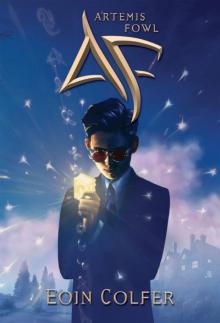 Artemis Fowl
Artemis Fowl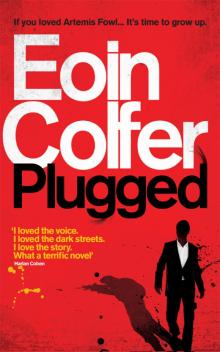 Plugged
Plugged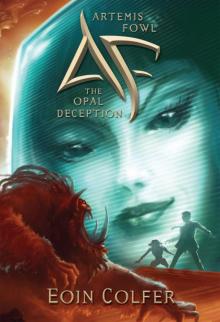 The Opal Deception
The Opal Deception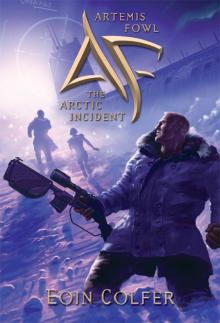 The Arctic Incident
The Arctic Incident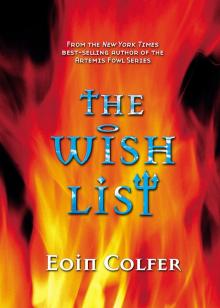 The Wish List
The Wish List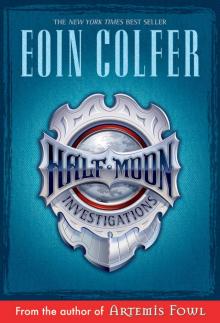 Novel - Half Moon Investigations
Novel - Half Moon Investigations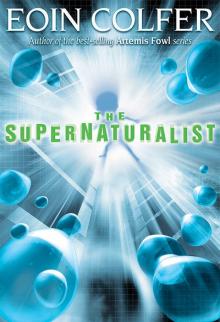 The Supernaturalist
The Supernaturalist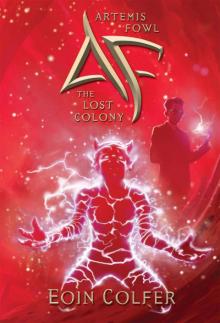 The Lost Colony
The Lost Colony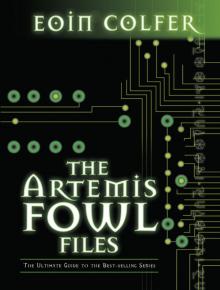 The Artemis Fowl Files
The Artemis Fowl Files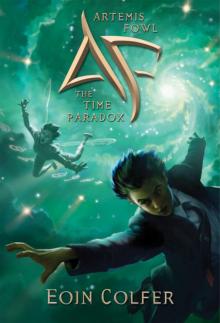 The Time Paradox
The Time Paradox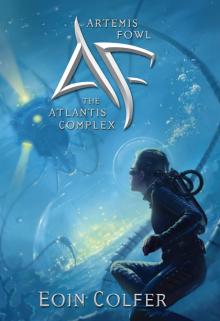 The Atlantis Complex
The Atlantis Complex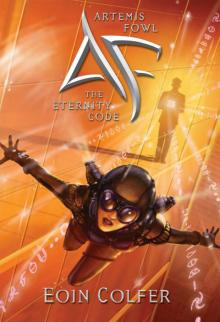 The Eternity Code
The Eternity Code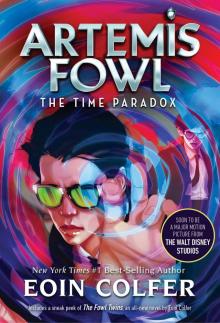 The Time Paradox (Disney)
The Time Paradox (Disney)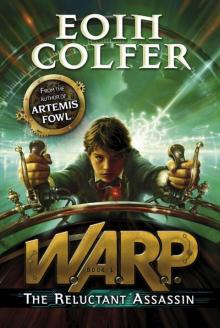 The Reluctant Assassin
The Reluctant Assassin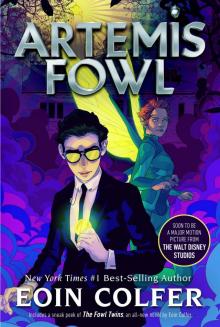 Artemis Fowl (Disney)
Artemis Fowl (Disney)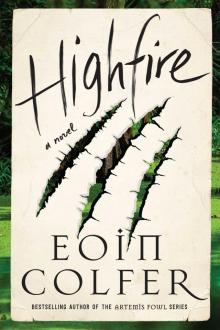 Highfire
Highfire The Last Guardian
The Last Guardian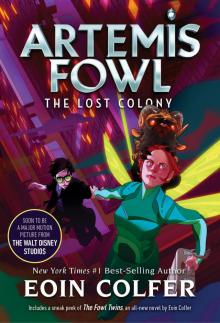 The Lost Colony (Disney)
The Lost Colony (Disney)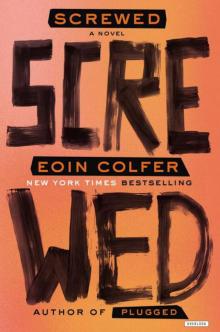 Screwed: A Novel
Screwed: A Novel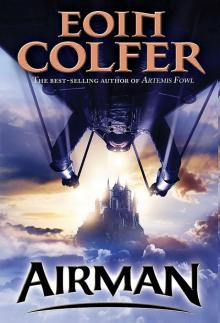 Novel - Airman
Novel - Airman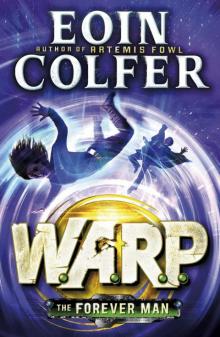 The Forever Man
The Forever Man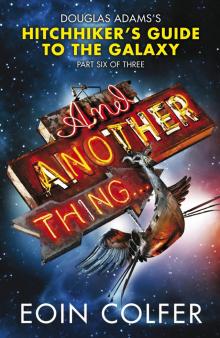 And Another Thing...
And Another Thing...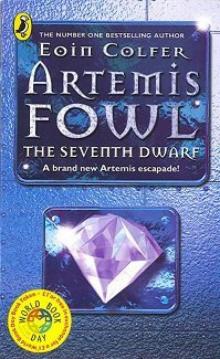 The Seventh Dwarf
The Seventh Dwarf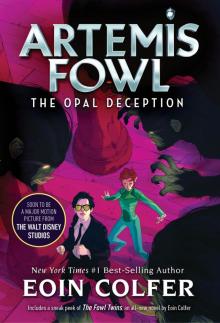 The Opal Deception (Disney)
The Opal Deception (Disney)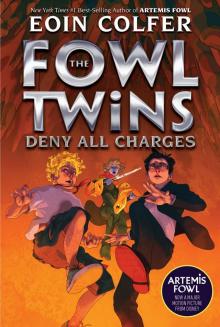 The Fowl Twins Deny All Charges
The Fowl Twins Deny All Charges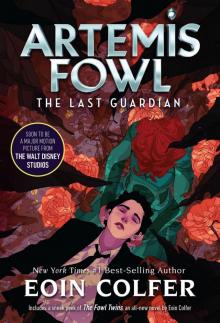 The Last Guardian (Disney)
The Last Guardian (Disney)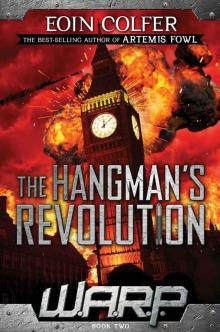 The Hangman's Revolution
The Hangman's Revolution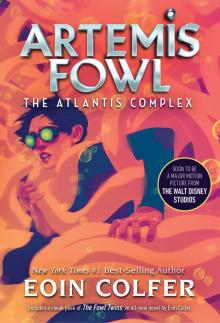 The Atlantis Complex (Disney)
The Atlantis Complex (Disney)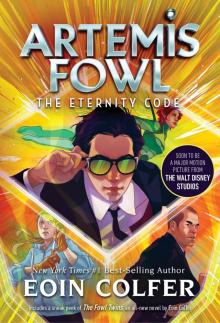 The Eternity Code (Disney)
The Eternity Code (Disney)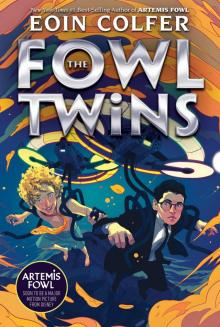 The Fowl Twins
The Fowl Twins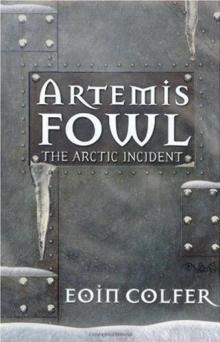 Artemis Fowl. The Arctic Incident af-2
Artemis Fowl. The Arctic Incident af-2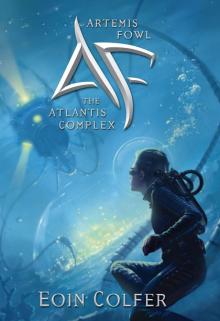 Artemis Fowl and the Atlantis Complex af-7
Artemis Fowl and the Atlantis Complex af-7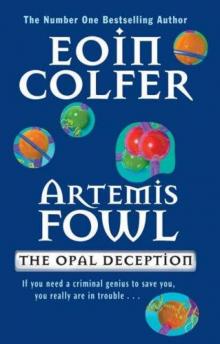 Artemis Fowl. The Opal Deception af-4
Artemis Fowl. The Opal Deception af-4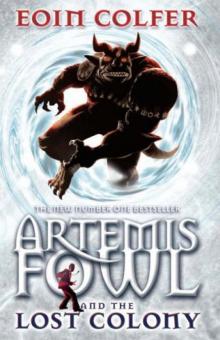 Artemis Fowl. The Lost Colony af-5
Artemis Fowl. The Lost Colony af-5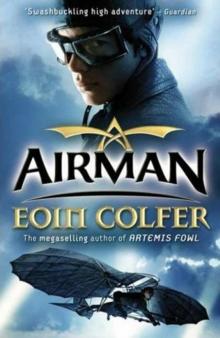 Airman
Airman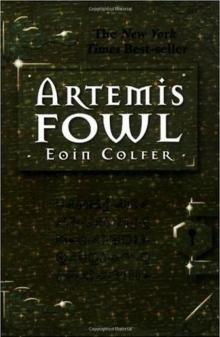 Artemis Fowl af-1
Artemis Fowl af-1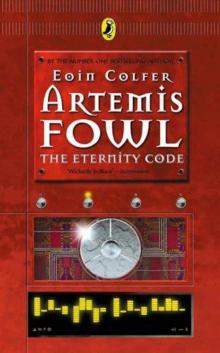 Artemis Fowl: The Eternity Code af-3
Artemis Fowl: The Eternity Code af-3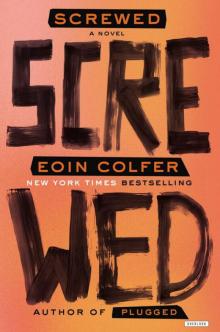 Screwed dm-2
Screwed dm-2